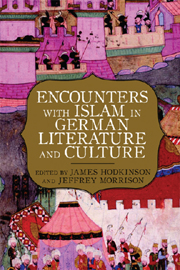Book contents
- Frontmatter
- Contents
- Acknowledgments
- Introduction
- 1 “cristen, ketzer, heiden, jüden”: Questions of Identity in the Middle Ages
- 2 Wolfram von Eschenbach, Islam, and the Crusades
- 3 Perverted Spaces: Boundary Negotiations in Early-Modern Turcica
- 4 Enlightenment Encounters the Islamic and Arabic Worlds: The German “Missing Link” in Said's Orientalist Narrative (Meiners and Herder)
- 5 Goethe, Islam, and the Orient: The Impetus for and Mode of Cultural Encounter in the West-östlicher Divan
- 6 Moving beyond the Binary? Christian-Islamic Encounters and Gender in the Thought and Literature of German Romanticism
- 7 Forms of Encounter with Islam around 1800: The Cases of Johann Hermann von Riedesel and Johann Ludwig Burckhardt
- 8 Displacing Orientalism: Ottoman Jihad, German Imperialism, and the Armenian Genocide
- 9 German-Islamic Literary Interperceptions in Works by Emily Ruete and Emine Sevgi Özdamar
- 10 Dialogues with Islam in the Writings of (Turkish-)German Intellectuals: A Historical Turn?
- 11 Michaela Mihriban Özelsel's Pilgrimage to Mecca: A Journey to Her Inner Self
- 12 Intimacies both Sacred and Profane: Islam in the Work of Emine Sevgi Özdamar, Zafer Şnocak, and Feridun Zaimoğlu
- 13 Encountering Islam at Its Roots: Ilija Trojanow's Zu den heiligen Quellen des Islam
- 14 The Lure of the Loser: On Hans Magnus Enzensberger's Schreckens Männer and Ian Buruma's Murder in Amsterdam
- Notes on the Contributors
- Index
4 - Enlightenment Encounters the Islamic and Arabic Worlds: The German “Missing Link” in Said's Orientalist Narrative (Meiners and Herder)
Published online by Cambridge University Press: 05 February 2013
- Frontmatter
- Contents
- Acknowledgments
- Introduction
- 1 “cristen, ketzer, heiden, jüden”: Questions of Identity in the Middle Ages
- 2 Wolfram von Eschenbach, Islam, and the Crusades
- 3 Perverted Spaces: Boundary Negotiations in Early-Modern Turcica
- 4 Enlightenment Encounters the Islamic and Arabic Worlds: The German “Missing Link” in Said's Orientalist Narrative (Meiners and Herder)
- 5 Goethe, Islam, and the Orient: The Impetus for and Mode of Cultural Encounter in the West-östlicher Divan
- 6 Moving beyond the Binary? Christian-Islamic Encounters and Gender in the Thought and Literature of German Romanticism
- 7 Forms of Encounter with Islam around 1800: The Cases of Johann Hermann von Riedesel and Johann Ludwig Burckhardt
- 8 Displacing Orientalism: Ottoman Jihad, German Imperialism, and the Armenian Genocide
- 9 German-Islamic Literary Interperceptions in Works by Emily Ruete and Emine Sevgi Özdamar
- 10 Dialogues with Islam in the Writings of (Turkish-)German Intellectuals: A Historical Turn?
- 11 Michaela Mihriban Özelsel's Pilgrimage to Mecca: A Journey to Her Inner Self
- 12 Intimacies both Sacred and Profane: Islam in the Work of Emine Sevgi Özdamar, Zafer Şnocak, and Feridun Zaimoğlu
- 13 Encountering Islam at Its Roots: Ilija Trojanow's Zu den heiligen Quellen des Islam
- 14 The Lure of the Loser: On Hans Magnus Enzensberger's Schreckens Männer and Ian Buruma's Murder in Amsterdam
- Notes on the Contributors
- Index
Summary
THE CRITIQUES OF EDWARD SAID'S 1978 BOOK Orientalism were many and varied, and some of them are addressed in the introduction to this volume. For the purposes of this chapter, the most relevant criticism is that Said did not adequately account for developments in the Germanspeaking lands. Anticipating this criticism, Said attempted to justify his virtual neglect of the German heritage. He argued that he focused on Britain and France because they were “the pioneer nations in the Orient and in Oriental studies,” and also that “these vanguard positions were held by virtue of the two greatest colonial networks in pre-twentieth-century history” (17). Further, he attests that “the sheer quality, consistency, and mass of British, French, and American writing on the Orient lifts it above the doubtless crucial work done in Germany, Italy, Russia, and elsewhere” (17). This is certainly true, though Said introduces a slight note of contradiction when he speaks of the “doubtless crucial work” in these countries and then dismisses its quality. With respect to German scholars in particular, though, the salient point is that they were armchair Orientalists—and thus
the German Orient was almost exclusively a scholarly, or at least a classical, Orient: it was made the subject of lyrics, fantasies, and even novels, but it was never actual, the way Egypt and Syria were actual for Chateaubriand, Lane, Lamartine, Burton, Disraeli, or Nerval. There is some significance in the fact that the two most renowned German works on the Orient, Goethe’s Westöstlicher Diwan [sic] and Friedrich Schlegel’s Über die Sprache und Weisheit der Inder, were based respectively on a Rhine journey and on hours spent in Paris libraries. What German Oriental scholarship did was to refine and elaborate techniques whose application was to texts, myths, ideas, and languages almost literally gathered from the Orient by imperial Britain and France. (19)
- Type
- Chapter
- Information
- Encounters with Islam in German Literature and Culture , pp. 73 - 88Publisher: Boydell & BrewerPrint publication year: 2009



